Glasgow comma scale - Study guides, Class notes & Summaries
Looking for the best study guides, study notes and summaries about Glasgow comma scale? On this page you'll find 33 study documents about Glasgow comma scale.
Page 3 out of 33 results
Sort by
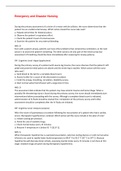
-
Emergency and Disaster Nursing
- Exam (elaborations) • 8 pages • 2022
-
- $23.99
- + learn more
Emergency and Disaster Nursing During the primary assessment of a victim of a motor vehicle collision, the nurse determines that the patient has an unobstructed airway. Which action should the nurse take next? a. Palpate extremities for bilateral pulses. b. Observe the patient's respiratory effort. c. Check the patient's level of consciousness. d. Examine the patient for any external bleeding. ANS: B Even with a patent airway, patients can have other problems that compromise ventilation, so ...
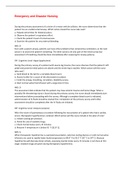
-
Emergency and Disaster Nursing
- Exam (elaborations) • 8 pages • 2022
-
- $12.49
- + learn more
Emergency and Disaster Nursing During the primary assessment of a victim of a motor vehicle collision, the nurse determines that the patient has an unobstructed airway. Which action should the nurse take next? a. Palpate extremities for bilateral pulses. b. Observe the patient's respiratory effort. c. Check the patient's level of consciousness. d. Examine the patient for any external bleeding. ANS: B Even with a patent airway, patients can have other problems that compromise ventilatio...
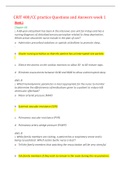
-
CRIT 480/CC practice Questions and Answers week 1,100% CORRECT
- Exam (elaborations) • 51 pages • 2022
-
- $17.49
- + learn more
CRIT 480/CC practice Questions and Answers week 1 Week 1 Chapter 66 1. A 68-year-old patient has been in the intensive care unit for 4 days and has a nursing diagnosis of disturbed sensory perception related to sleep deprivation. Which action should the nurse include in the plan of care? a Administer prescribed sedatives or opioids at bedtime to promote sleep. . b Cluster nursing activities so that the patient has uninterrupted rest periods. . c. Silence the alarms on the cardiac mon...
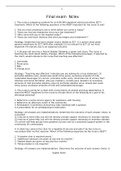
-
Final exam Nclex Questions and Answers 2022 update |Rated A+
- Exam (elaborations) • 67 pages • 2022
-
- $16.49
- + learn more
Final exam Nclex 1. The nurse is preparing a patient for an 8:00 AM outpatient electroconvulsive (ECT) treatment. Which of the following questions is the MOST important for the nurse to ask? 1. “Did you have anything to eat or drink before you came in today?” 2. “Have you had any headaches since your last treatment?” 3. “Who came with you to the hospital today?” 4. “Have you had much memory loss since you began your treatments?” Strategy: Determine how each answer ch...
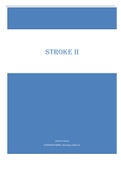
-
STROKE II
- Exam (elaborations) • 5 pages • 2023
-
- $20.99
- + learn more
[Author name] [COMPANY NAME] [Company address] STROKE II This study source was downloaded by from CourseH on 10-06-2021 11:24:52 GMT -05:00 1. After a patient experienced a brief episode of tinnitus, diplopia, and dysarthria with no residual effects, the nurse anticipates teaching the patient about a. cerebral aneurysm clipping. b. heparin intravenous infusion. c. oral low-dose aspirin therapy. d. tissue plasminogen activator (tPA). 2. A 68-year-old patient is being admitted with a p...
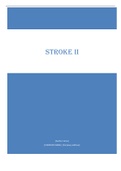
-
STROKE II
- Exam (elaborations) • 5 pages • 2023
-
- $8.99
- + learn more
[Author name] [COMPANY NAME] [Company address] STROKE II This study source was downloaded by from CourseH on 10-06-2021 11:24:52 GMT -05:00 1. After a patient experienced a brief episode of tinnitus, diplopia, and dysarthria with no residual effects, the nurse anticipates teaching the patient about a. cerebral aneurysm clipping. b. heparin intravenous infusion. c. oral low-dose aspirin therapy. d. tissue plasminogen activator (tPA). 2. A 68-year-old patient is being admitted with a p...
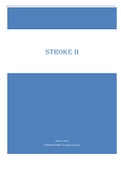
-
STROKE II
- Exam (elaborations) • 5 pages • 2023
-
- $15.99
- + learn more
[Author name] [COMPANY NAME] [Company address] STROKE II This study source was downloaded by from CourseH on 10-06-2021 11:24:52 GMT -05:00 1. After a patient experienced a brief episode of tinnitus, diplopia, and dysarthria with no residual effects, the nurse anticipates teaching the patient about a. cerebral aneurysm clipping. b. heparin intravenous infusion. c. oral low-dose aspirin therapy. d. tissue plasminogen activator (tPA). 2. A 68-year-old patient is being admitted with a p...
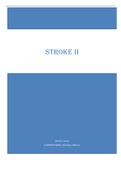
-
STROKE II
- Exam (elaborations) • 5 pages • 2023
-
- $8.99
- + learn more
[Author name] [COMPANY NAME] [Company address] STROKE II This study source was downloaded by from CourseH on 10-06-2021 11:24:52 GMT -05:00 1. After a patient experienced a brief episode of tinnitus, diplopia, and dysarthria with no residual effects, the nurse anticipates teaching the patient about a. cerebral aneurysm clipping. b. heparin intravenous infusion. c. oral low-dose aspirin therapy. d. tissue plasminogen activator (tPA). 2. A 68-year-old patient is being admitted with a p...
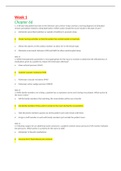
-
CRIT 480 Week 1 Critical Care Practice Questions and Answers (GRADED A+) | (100 out of 100) | Guaranteed pass
- Exam (elaborations) • 26 pages • 2021
- Available in package deal
-
- $10.99
- + learn more
Week 1 Chapter 66 1. A 68-year-old patient has been in the intensive care unit for 4 days and has a nursing diagnosis of disturbed sensory perception related to sleep deprivation. Which action shoul d the nurse include in the plan of care? a Administer prescribed sedatives or opioids at bedtime to promote sleep. . b Cluster nursing activities so that the patient has uninterrupted rest periods. . c. Silence the alarms on the cardiac monitors to allow 30- to 40-minute naps. d Eliminate assessments...
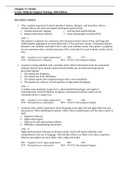
-
Stroke
- Exam (elaborations) • 11 pages • 2022
-
- $17.99
- + learn more
Chapter 57: Stroke Lewis: Medical-Surgical Nursing, 10th Edition MULTIPLE CHOICE 1. After a patient experienced a brief episode of tinnitus, diplopia, and dysarthria with no residual effects, the nurse anticipates teaching the patient about a. cerebral aneurysm clipping. c. oral low-dose aspirin therapy. b. heparin intravenous infusion. d. tissue plasminogen activator (tPA). ANS: C The patient’s symptoms are consistent with transient ischemic attack (TIA), and drugs that inhibit plate...

How much did you already spend on Stuvia? Imagine there are plenty more of you out there paying for study notes, but this time YOU are the seller. Ka-ching! Discover all about earning on Stuvia


